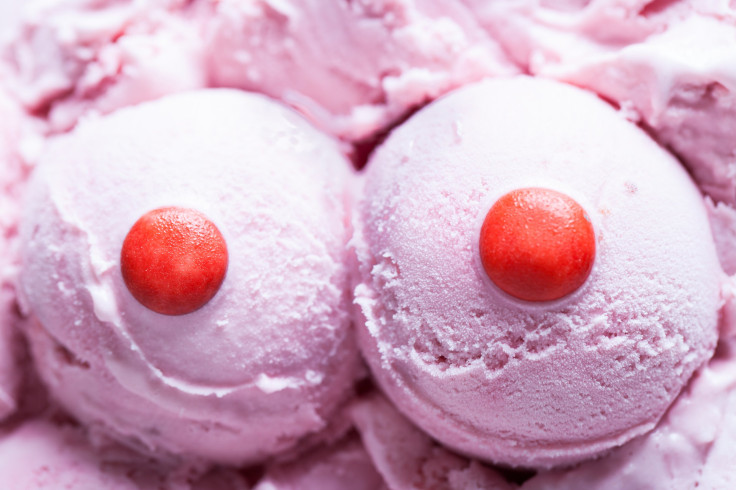Double Trouble? How Your Breast Size Speaks Volumes About You

Both men and women are obsessed with breasts; men ogle at women’s “fun bags,” while women wish they had a bigger or smaller cup size. The average American bra size has swelled up from 34B to 34DD in just a 30-year time span due to better education on bra fit, breast augmentation, and obesity. And a woman’s breast size can reveal more than just how big (or small) her breasts are — it can speak volumes when it comes to her personality and lifestyle.
Bra sizes have become a hot topic in the scientific community, with numerous studies linking breast size to character traits like being frivolous with money to consuming copious amounts of coffee. In no particular order, here's what your bra size says about you:
1. Bigger Than A B-Cup, Bigger Spender
The amount of money you spend on lingerie could be contingent on your breast size. A study conducted by Alibaba, a Chinese e-commerce giant, found customers who bought a bra with a cup size of B or smaller tended to spend less than their more endowed counterparts. The total money spent was divided into five categories: low, slightly low, middle, slightly high, and high. Only seven percent of B-sized women tended to buy in either of the “high spending” categories, while D-sized women were 24 percent more likely.
This correlation is speculated to be linked to the possibility specialty sizes for larger-breasted women are more expensive than smaller ones. Also, it could be linked to the fact that women who go under the knife for breast augmentation with E-cup breasts could also afford to go on a shopping spree at high-end lingerie stores. The exact correlation between bigger breasts and bigger spending has yet to be known, but there is an association nonetheless.
2. Bigger Breasts, More Likely To Have Lower Self-Esteem And Eating Disorders
Whether breasts are small, large, or average-sized, they can have many implications when it comes to women’s mental health. Women with asymmetrical breasts, extra-large breasts, and those with a relatively mild but noticeable difference in breast size are more likely to suffer from self-esteem issues and eating disorders, according to a study published in the journal Plastic and Reconstructive Surgery. Dr. Rod J. Rohrich, editor-in-chief of the journal of Plastic and Reconstructive Surgery explains that mismatched and macromastia (overly large breasts) are "unfortunately often classified as a cosmetic issue [when it] is truly a condition which has lasting psychological and emotional effects."
These findings may sound counterintuitive, especially since society glorifies voluptuous models like Victoria’s Secret angels and well-endowed actresses. However, there is a physical and mental burden that comes with bigger breasts. They can lead to the inability to be physically active and may lead to chronic pain in the neck, shoulders, and back from the breast weight strain. Mentally, bigger boobs can also make women subjected to boob-shaming since they are viewed by society as less intelligent and more promiscuous.
3. Bigger Breasts, Higher IQ
Contrary to popular and unfounded belief, large-breasted women actually have higher intelligence than their less-endowed counterparts. A 2011 University of Chicago study found larger-breasted women scored an average of 10 points higher than other women in IQ tests. Women with average-sized breasts also scored higher than those who were the smallest size in the group. The women were divided into five categories based on their breast measurements: extra-large, large, medium, small, and extra-small breast sizes.
It has not yet been determined why the correlation between breast size and intelligence may exist, but it’s suspected to have something to do with sex hormone levels. They help determine a woman’s breast size. Also, it could be linked to the possibility about natural selection where intelligent men prefer larger breasted women for reproductive partners to ensure their offspring will inherit a larger breast size and higher intelligence.
4. Bigger Breasts, More Likely To Be Nurturing
Men tend to find larger breasts more attractive — unless they’re not interested in fatherhood. A 2012 study published in the journal Archives of Sexual Behavior found men who wished to remain childless preferred smaller breasts, while those who preferred larger breasts had a desire to become a dad. These findings imply large breasts are an innate signal of a woman’s physical capacity to bear and nurture children. It seems there is an association between a particular fertility-related hormone and larger breast tissue.
5. Smaller Breasts, Heavy Coffee Drinker
Women with smaller breasts could be considered heavy coffee drinkers, consuming just three cups a day. A study published in the British Journal of Cancer found three cups a day was enough to start making breasts shrink, with the effects increasing for every additional cup of coffee consumed. The researchers established a clear link between drinking coffee and smaller breast as about half of women possessed a gene shown to link breast size to coffee intake.
"Drinking coffee can have a major effect on breast size," said Helena Jernstroem, a lecturer in experimental oncology at Lund University. "Coffee-drinking women do not have to worry their breasts will shrink to nothing overnight. They will get smaller, but the breasts aren't just going to disappear."
6. Bigger Breasts With Augmentation, More Likely To Commit Suicide
Women who get breast implants are found to be at least three times more likely to commit suicide — a risk that increases with time. A 2007 study published in Annals of Plastic Surgery found the increased risk of suicide became apparent 10 years after a woman received implants. The researchers believe such suicides could have been attributable to either pre-existing psychiatric problems that probably made some women prone to suicidal behavior.
Published by Medicaldaily.com



























